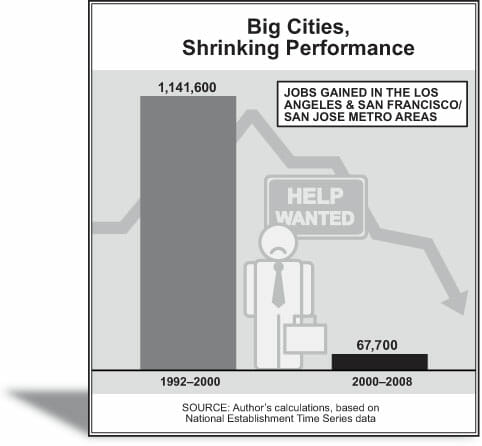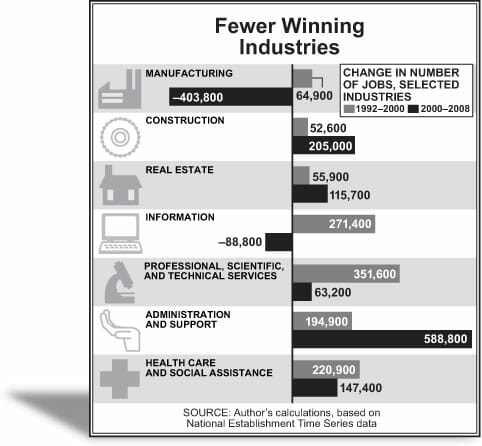Least Surprising Statistic

via here, which has a lot of good data on California job losses.
If you have a service business, I can understand the desire to get access to the large and wealthy populations in these areas. I even started a service operation in the LA area about 4 years ago, though I regret it intensely (other operations we have in rural CA are difficult but much easier than in LA). But even so, why would anyone ever, ever start a manufacturing or any other business in these locations if it could be located anywhere else?
I was at a cocktail party the other night lamenting to a number of business owners (more successful folks than I) about problems I am having in CA. Usually I get sympathy, but there was none to be had. They looked at me like I was a moron, like I was the guy who went $30,000 in debt for a puppetry degree. They said they had gotten out of CA years ago, would never go back, and (essentially) if I was stupid enough to be there, it was my own damn fault.
Unfortunately, a lot of the recreation is there, and for better or for worse, we have found that we are better and more efficient at dealing with a lot of the CA-induced mess than other companies. But I often wonder if I am crazy to be there.
PS- as an example, it took us 4-1/2 years to get a permit for a 1000 gallon double wall gas tank at a marina in Ventura County. We just got it approved last month, so at last we can stop hauling truckloads of 5-gallon fuel tanks from the gas station. We are in the third year of trying to get permitting approval to replace (in kind, same size and features) a bathroom building in a campground.
Update: All the job gains are in industries, like health care and construction, where the jobs have to be near the population served. Compare that to manufacturing and tech.

Is the increase in Administration & Support related to increased bureaucratic burden?
California loves to brag about its diversity, and how that has contributed to the innovation seen from the State's companies.
But I wonder if high foreign immigration rates have contributed to California's bureaucracy, as many of those people have come from far worse environments, and thus are willing to put up w/ their nonsense.
I wish the tea party movement would focus more on dysfunctional state and local governments, which I see as a bigger problem than the Feds. But for some reason the vast majority of the anger seems to be directed towards Washington with little left over for the states.
I live in the middle of Silicon Valley. When I first got here in 1969, the place was a beehive of activity. I mean, they made EVERYTHING locally. But sometime in the 70s, some of the semiconductor plants experienced leaking underground tanks, contaminating the water table. Fairchild was probably the best known case. The EPA's "special super fund cleanup" stepped in and forced these companies to pay millions to clean it all up. When the dust settled, there was no more semiconductor manufacturing in the Valley. It's all been outsourced, out of the state and out of the country. When those businesses moved their manufacturing, the peripherally-associated jobs disappeared, too.
Years ago, there were probably a hundred companies around here that made printed circuit boards. Today? I don't know of a one. Such are the environmental rules that cripple any company that wants to make ANYTHING. It's far cheaper and easier to design your printed circuit board on your computer, email the file to a company in China (where they have no such restrictions), and get the board shipped back to you in a couple of days via FedEx. Just like electric cars, the locals love to think of themselves as green, but all they do is export their pollution, if any, to other parts of the planet.
Since then, Silicon Valley is a hollow shell of its former self. It consists mostly of cerebral ventures (software, paper design, etc.), but no more silicon foundries, which is how the Valley got its name. Apple designs its products in Cupertino, but then farms out the actual manufacture. People routinely bitch about Apple's Chinese-made products, but the dirty truth is that if Apple even attempted to set up a manufacturing facility in the Valley, it would take decades to get the permits, and countless billions to build the plants that would comply with the millions of environmental restrictions. Worst of all, people have come to accept that "clean water and clean air" means "no manufacturing in my backyard." These are the very same people who bitch and whine that nothing is made in the USA anymore.
Steve Jobs himself, we have now found out, implored Obama to make the USA more business-friendly, but Obama declined. Jobs categorically told him that he could not possibly build his products here. The real tragedy is that Jobs still stuck by Obama and wanted to help re-elect the guy!
Judging by the graph, the whole point of California is to make and sell real estate with an army of administrators to make sure that supply never meets demand.
Building on Ian's observation:
California. Everyone wants to live there but nobody wants to do anything.
I understand the network effects, but I can't understand how to run a company when trucks just aren't allowed on the road during business hours. Feels like Soviet Union.
I work in the apparel industry and unless I had no other choice, would not manufacture in CA due to their onerous garment licensing. A designer can't even work from a home office; they have to have a commercial location, take an exam and pay an annual $750 fee (for sales $500,000 or less). Worse, CA has a law called Prop 65 which affects anyone SELLING sewn products within state lines. Any party can bring suit against you and recoup 25% of any fines levied for non-compliant handbags, shoes, whatever.
All that said, the most recent issue of WWD says that increasing domestic jeans production (it isn't as profitable to produce in China anymore) has spurred hiring and total apparel manufacturing jobs in Orange County have increased 7% over last year. Personally, I wouldn't make jeans there either. Jeans production in El Paso TX (formerly known as the 5 pocket capital of the world) costs at least 30% less than in California.
A company founded in 1936 moved from Santa Ana to Dallas, taking thirty jobs with it. The CEO told me, even factoring in the cost of the move, they saved $800,000 their first year.
"the whole point of California is to make and sell real estate with an army of administrators to make sure that supply never meets demand"
That is pretty much what California's land use rules do. Sadly, its ill-informed electorate blame "developer's greed" for the aforesaid overpriced real estate, not the government-mandated rules they must labor under.
Obviously, it's because of the Bush Presidency! :-)